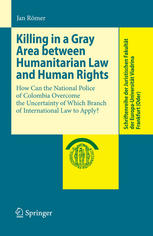

Most ebook files are in PDF format, so you can easily read them using various software such as Foxit Reader or directly on the Google Chrome browser.
Some ebook files are released by publishers in other formats such as .awz, .mobi, .epub, .fb2, etc. You may need to install specific software to read these formats on mobile/PC, such as Calibre.
Please read the tutorial at this link: https://ebookbell.com/faq
We offer FREE conversion to the popular formats you request; however, this may take some time. Therefore, right after payment, please email us, and we will try to provide the service as quickly as possible.
For some exceptional file formats or broken links (if any), please refrain from opening any disputes. Instead, email us first, and we will try to assist within a maximum of 6 hours.
EbookBell Team

4.3
48 reviewsArmed forces can be confronted with the problem of correctly classifying a targeted group as one that is or is not party to an armed conflict. In particular, this happens in a context of a high level of violence where a non-international armed conflict is (likely) occurring at the same time, such as in Iraq, Afghanistan, Brazil or Mexico. The difficulty of qualifying the targeted group leads to a legal uncertainty in which it is unclear whether an operation is governed by international humanitarian law or the international law of human rights. The problem is of particular interest when lethal force is resorted to, as killing might be illegal under one of the two branches. The book attempts to provide guidance on how this uncertainty can be overcome. In order to do so, the requirements to kill under IHL and human rights law are analyzed and compared, as well as assessed in concrete operations of the National Police of Colombia who face this problem on a regular basis.